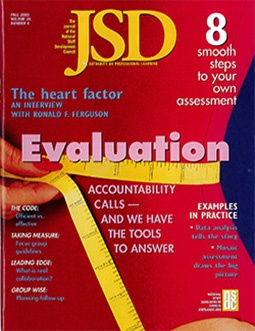
Evaluation
October 2003
Vol. 24, No. 4
Read the remaining content with membership access. Join or log in below to continue.
Sed ut perspiciatis unde omnis iste natus error sit voluptatem accusantium doloremque laudantium, totam rem aperiam, eaque ipsa quae ab illo inventore veritatis et quasi architecto beatae vitae dicta sunt explicabo. Nemo enim ipsam voluptatem quia voluptas sit aspernatur aut odit aut fugit, sed quia consequuntur magni dolores eos qui ratione voluptatem sequi nesciunt. Neque porro quisquam est, qui dolorem ipsum quia dolor sit amet, consectetur, adipisci velit, sed quia non numquam eius modi tempora incidunt ut labore et dolore magnam aliquam quaerat voluptatem.
In This Issue
ARTICLES
We care, therefore they learn
Project about the achievement gap demonstrates that encouragement can lead to achievement.
Expanding expectations for students through accelerated schools
What does accelerated learning mean?
3 ways to fund literacy coaching
California state funding is specifically designated to support coaches.
‘Collaboration lite’ puts student achievement on a starvation diet
Calls for a collaborative culture come from leading educational researchers who use unusually emphatic language.
Connecting all the pieces
Mosaic approach to evaluation makes a complete picture.
Frank discussion in focus groups can yield useful data
Organizations everywhere are trying focus groups.
So much to learn, so little opportunity
How strange and ironic it is that teachers, who disseminate knowledge, have so little time and opportunity to acquire it.
Scooping up meaningful evidence
Backward planning, combined with collecting evidence each step of the way, helps staff developers meet goals of No Child Left Behind.
3 ways to fund literacy coaching
Help teachers re-evaluate how they’re teaching literacy and help them try new strategies.
Facilitator: 10 Refreshments: 8 Evaluation: 0
Workshop satisfaction misses the point. Evaluation means understanding what participants learn, when and how they apply the learning, and when and how it benefits students.
As trainings grow shorter, follow-up plays a bigger role
Challenges of creating effective groups.
8 smooth steps
Solid footwork makes evaluation of staff development programs a song.
My mentor, myself
District uses data collection and analysis to create and refine a program to help teachers and students.
Recent Issues
WHERE TECHNOLOGY CAN TAKE US
April 2024
Technology is both a topic and a tool for professional learning. This issue examines benefits, challenges, and what learning leaders need to know.Read the remaining content with membership access. Join […]
EVALUATING PROFESSIONAL LEARNING
February 2024
How do you know your professional learning is working? This issue digs into evaluation purposes, methods, tools, and results.
TAKING THE NEXT STEP
December 2023
Professional learning can open up new roles and challenges and help educators thrive in them. This issue shows how that benefits staff and students alike.
REACHING ALL LEARNERS
October 2023
Both special education and general education teachers need support to help students with disabilities succeed. This issue highlights how professional learning can help ensure that all students’ needs are met.Read […]






